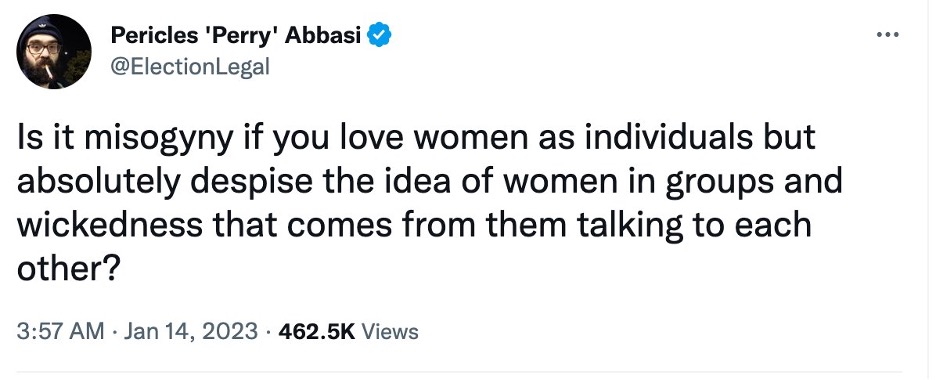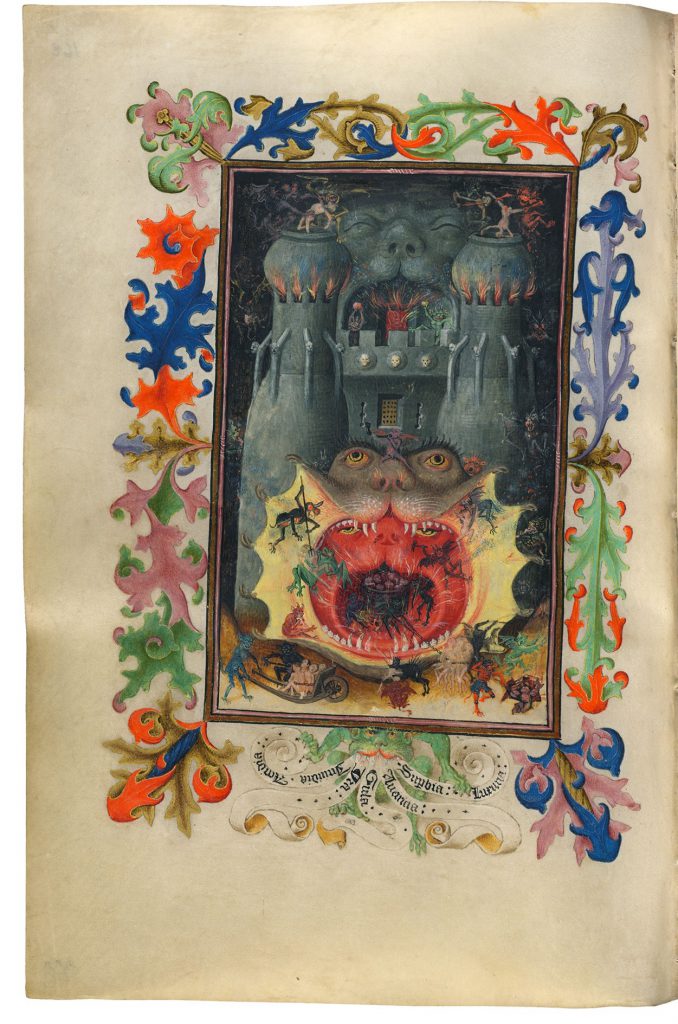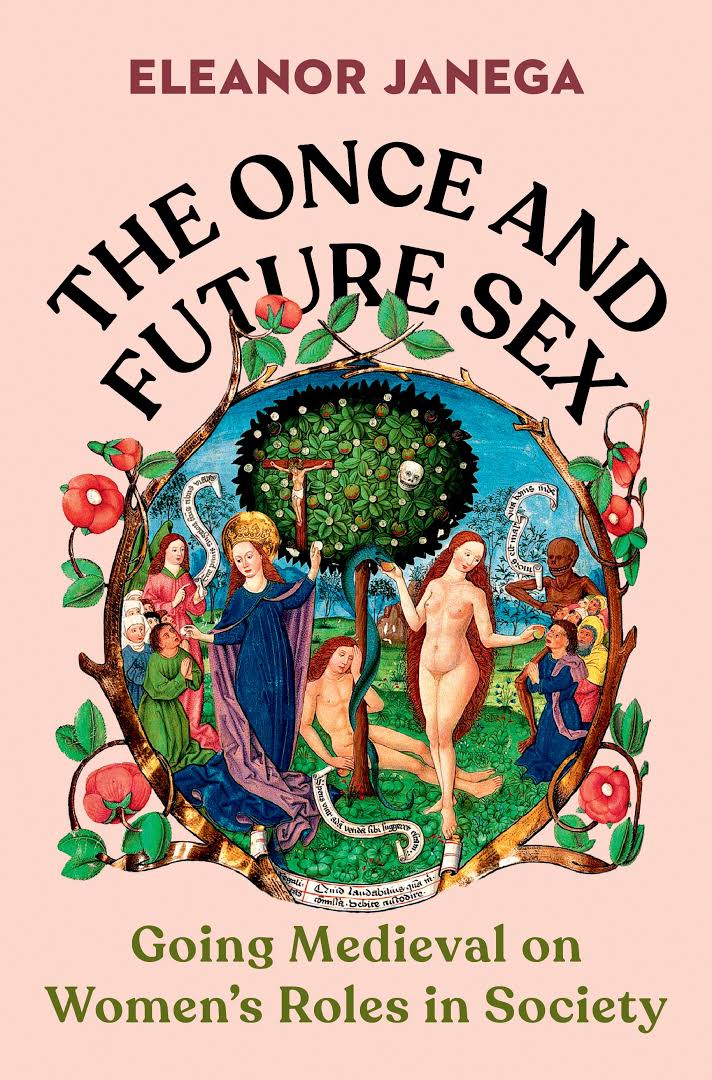My loves, I have been remiss in writing for you because, well, I wrote a book. I don’t know if you have heard this but that is very hard. As a result, I have been doing a lot of work to see it safely out into the world and hopefully into your hands at some point. And lo, it is now out in the States, and will be out in the UK/Aus/NZ in March. The book, in question, is entitled The Once and Future Sex: Going Medieval on Women’s Roles in Society.
Now as you know we have a lot of fun around here talking about the fact that medieval women did, in fact, exist. But you could be forgiven for not knowing that if you don’t hang out here because of how a lot of history is written. More specifically, because talking about women is expressly treated as niche or unnecessary. History, we are told, is something created by GREAT MEN who go out and CHANGE THE WORLD, usually by doing huge and horrific levels of violence.
That is not, in fact the case. More particularly it isn’t the case if you are me and are a social historian. Like, sure, I dig individuals in the past, and we can learn a lot about society by looking at their stories when the come to light. (Shout out to Joan of Leeds, you’re a real one girl.) However, the great majority of history was made by regular ass people who were going about their business and living their lives firmly ensconced within the social mores of their time. That is where the good stuff happens. Why? Because that is the sort of thing that continues to influence us now.
Anyway, that is why I wrote my book in the first place – to add to the history that acknowledges that women existed and are important, but also to better explain why it is that our society treats women the way that it does.
Now I am sure that plenty of people would quite rightly feel that it is a bit weird about the idea that our society still replicates conceptions about women from the medieval period. And to be fair, in actual fact, what I talk about the most in the book is that it’s true that a lot of ideas about women have changed since the medieval period. The medieval beauty standard? Really different to ours. Ideas about women and sexuality? Massively dissimilar. Conceptions about women and work? Extremely not the same. However, there are certain things that remain the same and well, I found one today in the wild (on the burnt out husk of Twitter):

This right here? That’s an actual, factual medieval attitude towards women. Individual women like, say, the Virgin Mary are good. But women together are bad. Because they talk.
The aversion to talk, or more specifically, gossip, has a long history in our modern society. The simple pleasure of hanging out and chatting with the girlies has been called the lowest form of discourse, idle, the resort of small things and – possibly my favourite contemporary put down – the Devil’s radio. And why would that be? Well, the thing is that when women got together they might share their experiences. Those experiences, if voiced might (even worse!) paint men in a bad light! Which you must understand is necessarily bad.
Women’s tendency to talk about their lives and experiences crops up uneasily in all sorts of places. For example, when reading up on women and washing for the book I was treated to this incredible passage about what goes on as women do the laundry: “The washing is rinsed, twisted, and beaten in the wash-house where the tongues are quite as active as the washer-woman’s beetles; it is the seat of feminine justice with little mercy for the men-folk. Soaped from head to foot, soaped again, and rinsed down, they go through some bad times ….”.[1]

Women often pooled their resources for physically demanding tasks like washing, which makes sense. But the hater patrol must have you know that this is a bad thing. Sure you might think that your wife is just getting help lugging huge amounts of wet cloth around, but actually she might be telling people about the way you treat her as well! Shock! Horror! Wickedness!
And well, frankly, these were the least of the worries that men had about women getting together while they worked and talked. On the low end of the scale you have gossip, but on the upper end you had black magic.
Buchard of Worms (c. 950 – 1025), who friends of the blog may remember as the dildo guy, urged priests to ask their parishioners whether they “[h]ave ever been present at, or consented to, the vanities which women practice in their woolen work, in their weaving, who when they begin their weaving hope to be able to bring it about that with incantations and with their actions that the threads of the warp and of the woof have become so intertwined that unless [one] makes use of these other diabolical counter-incantations, he will perish totally? If you have ever been present or consented you must to penance for thirty days on bread and water.”[2]
If you are enjoying this post, why not support the blog by subscribing to the Patreon, from as little as £ 1 per month? It keeps the blog going, and you also get extra content. If not, that is chill too.
You know how it is – you are hanging out weaving, someone suggests doing some weaving death magic and you are like, “Oh Theophane you are so naughty tee hee, ok. I hope my priest doesn’t ask about this in confession!” I mean I guess shout out to Buchard who is like, “Yeah I mean they all do that? Thirty days penance.”

Cuz here’s the thing, over the medieval period worry about gossip and how people talk – even if it was just talk and not magic per se – started to seriously increase.
In the thirteenth and fourteenth centuries the Church suddenly got way more worried about what they called “the sins of the tongue”.[3] After the Fourth Lateran Council of 1215 established the necessity for all Christians to attend confession, presumably so they could be told to stop doing weaving magic, there were suddenly way more texts which enumerated the possible sins which could be confessed. Most of these new works on the subjects had a least one chapter dedicated to talking about how bad it was to talk trash to your friends.[4] It was around this time that we also see a big rise in the number of hell mouths depicted in both visual art and mystery plays.[5] These were meant to remind the audience that unregulated mouths were the road to hell.

Now in theory anyone could be guilty of the sins of the tongue. But the thing is also in theory it is much more likely that women would be doing it because it was considered to be a part of their very nature. And I mean in literal gender theory. Because they were cold and wet in humoral terms, Aristotle (384 – 322 BCE) declared that women were also… “more mischievous, less simple, more impulsive … more compassionate … more easily moved to tears … more jealous, more querulous, more apt to scold and strike … more prone to despondency and less hopeful … more void of shame or self-respect, more false of speech, more deceptive, or more retentive memory …. More wakeful; more shrinking, more difficult to rouse to action” than dudes.[6] And frankly, medieval people were absolutely wild about Aristotle and tended to agree.
So of course when they were sitting around talking in mysterious women only venues they would be saying bad things about you and damaging your reputation, or resorting to magic. Women can’t help but scold and say “false” things. Because they are cold.
All of which brings us to where conversations about medieval misogyny will so often end – the Malleus Maleficarum or Hammer of Witches by yer man there Heinrich Kramer (c. 1430-1505). Heinrich was a noted hater and incredibly down bad for a woman named Helena Scheuberin probably because she was a rich successful hottie who was known for telling dudes off. More specifically she was known for telling Henrich off, in public, allegedly yelling at him “Fie on you, you bad monk, may the falling evil take you” as well as telling people not to attend his sermons because “she believed Institor to be an evil man in league with the devil.”[7] Anyway Henrich put her on trial for witchcraft and lost really badly. He went away mad about it to write the Malleus to justify all the absolutely wild stuff he had accused Helena of at trial.

The result was him declaring that women get themselves into trouble and do evil things because they “… are more credulous [then men] … [and] they have slippery tongues, and are unable to conceal from their fellow-women those things which by evil arts they know; and since they are weak, they find an easy and secret manner of vindicating themselves by witchcraft. …. Since they are feebler both in mind and body, it is not surprising that they should come more under the spell of witchcraft.”[8]
The problem isn’t that a cool sexy chick told Heinrich off (and, incidentally, was totally right about him.) The problem was that women talk at all and when they do not only do they read stupid men for absolute filth, they also share magic spells and talk about things even more evil than the fact that the new priest in town sucks.
Now I doubt that the silly man who pays for twitter seen above thinks women are doing black magic when they get together to chat. He has, however, grown up in a society that has been concerned with the way that women speak when they are alone for hundreds of years, and as a result still categorises women’s speech as “wicked”.
And you know what? He is right in that there is something special that happens when women get together and share their experiences. They can advise each other about whether situations are unsafe. These are the whisper networks that have evolved to keep people safe in a world that often rewards and protects dangerous and powerful people. When women are alone they also participate in the lifechanging magic of bigging each other up. There is no more positive and wonderful place on earth than a women’s bathroom in a club where girls tell each other how cute they look.
And to a loser like this that is wicked. It is wicked for women to avoid predation. More to the point, it’s certainly wicked for women to have a sense of their own beauty and worth. Men like this want women isolated, alone, and at their own beck and call. Mostly because they suck.
Understanding the history of women in society isn’t going to stop pricks like that from existing. It does, however, allow us to see the social constructs that allow him to voice that opinion in public without embarrassment. The better we become at understanding how we have created a society that censures women for things as small as talking to each other, the more quickly we can decide that we aren’t participating in those old structures. We can build something new and better, but not until we stop listening to a bunch of dead guys who were mad cuz a woman told them off one time.
Anyway, I wrote a book about it. You should check it out.
[1] Martine Segalen, Love and Power in the Peasant Family, (Oxford: Basil Blackwell, 1983), pp. 138-139.
[2] Following Audrey L. Meaney in Anglo-Saxon Amulets and Curing Stones. BAR British Series, (Oxford: British Archaeological Reports,1981), p. 185.
[3] Wedward D. Craun, Lies, Slander, and Obscenity in Medieval English Literature: Pastoral Rhetoric, and the Deviant Speaker, (Cambridge, 1997).
[4] Sandy Bardsley, ‘Sin, Speech, and Scolding in Late Medieval England’, in, Thelma S. Fenster and Daniel Lord Smail (eds.), Fama: The Politics of Talk and Reputation in Medieval Europe, (Ithaca, N.Y. and London, 2003), p. 146.
[5] Patricia Dignan, Hellmouth and Villains: The Role of the Uncontrolled Mouth in Four Middle English Mystery Plays, PhD., University of Cincinnati, 1994.
[6] Aristotle, History of Animals, 608 b 1-14.
[7] Hans Peter Broedel, The Malleus Maleficarum and the Construction of Witchcraft : Theology and Popular Belief, (Manchester: Manchester University Press, 2003).
[8] Heinrch Kramer, The Malleus Malificarum, ed. Montague Summers, (New York: Dover Publications, 1971), pp. 43-47.
For more on medieval women, read my book, but also, see:
On women, pleasure, and semen
On women having sex with themselves
On Jezebel, makeup, and other apocalyptic signs
On courtly love and pick up artists
On conflating drag, (and femininity), with sexuality
On Sex, Logic, and Being the Subject
Support the blog by subscribing to the Patreon, from as little as £ 1 per month! It’s the cool thing to do!
My book, The Once And Future Sex: Going Medieval on Women’s Roles in Society, is out now.

© Eleanor Janega, 2024


Congratulations on the new book–I can’t wait to read it!
LikeLike
NZ has to wait until March?? Effing March???!! I was just feeling all stoked about being able to read it next week.
LikeLike
It has been alleged that you can get it on kindle now!
LikeLike
FWIW, the kindle version of the book is available to read now, on Amazon Au.
LikeLike
Oh thanks for that Martin!
LikeLike
This reminds of the character of Maria talking about Sir Andrew Aguecheek to Sir Toby Belch in Shakespeare’s play Twelfth Night.
Belch responds:
Maria unfazed persists:
From the play, it is reasonable to infer that ‘they’ might be Countess Olivia’s other serving-women. Gossip is portrayed positively in the play, I’d say: even if What great ones do the less will prattle of the grapevine reportage seems largely truthful.
LikeLike